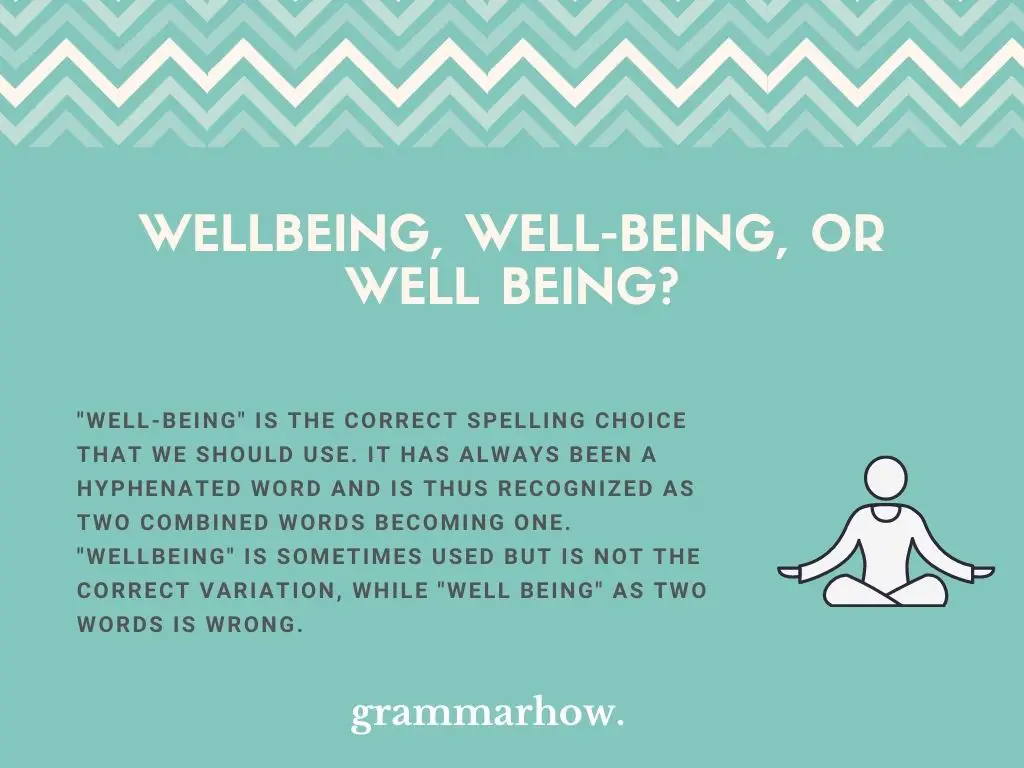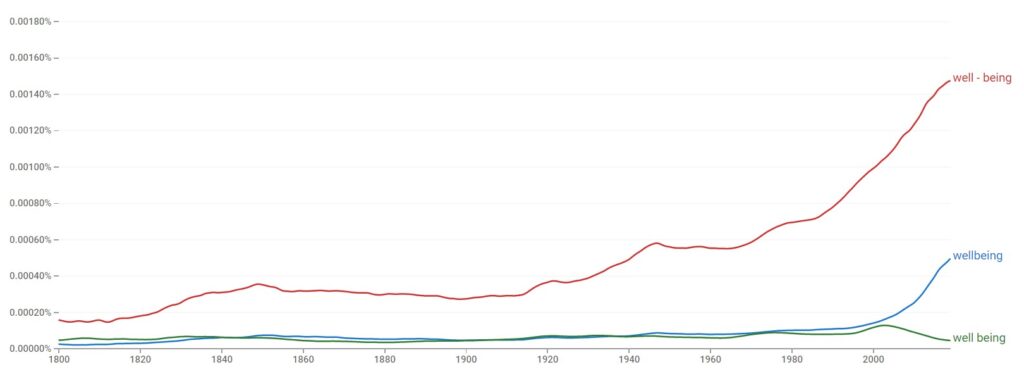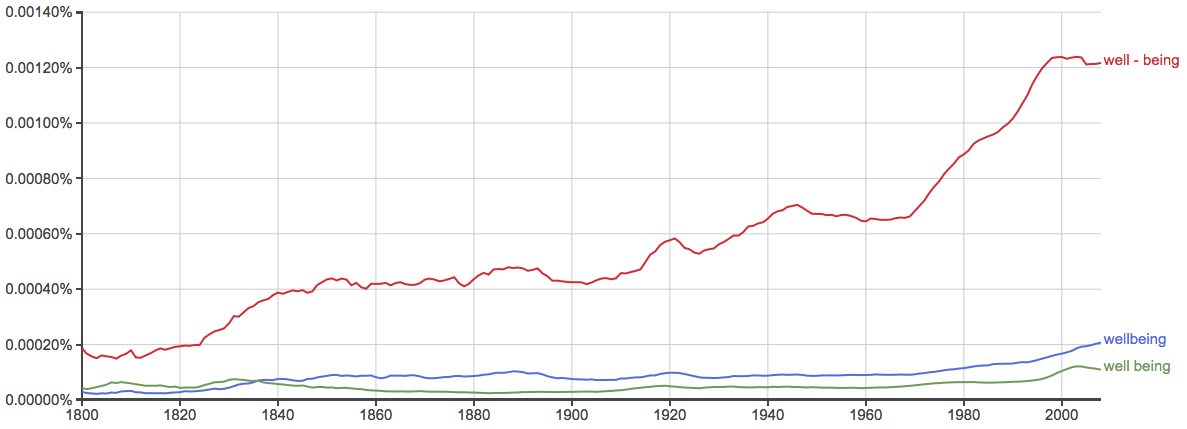Synonym: eudaemonia, eudaimonia, upbeat, welfare, wellbeing. Similar words: well behaved, come into being, well-bred, for the time being, swelling, dwelling, albeit, fall behind. Meaning: [ˌwelˈbiːɪŋ] n. a contented state of being happy and healthy and prosperous.
Random good picture Not show
1. We are responsible for the care and well-being of all our patients.
2. A good meal promotes a feeling of well-being.
3. She was filled with a sense of well-being.
4. We try to ensure the well-being of our employees.
5. The care and well-being of patients should always come first.
6. We are now concerned for the economic well-being of the country.
7. We are concerned with the physical and psychological well-being of our employees.
8. Yet the present mood of well-being is curious.
9. Two more components were necessary, for the deceased’s well-being.
10. I was not worried for my well-being.
11. The general sense of well-being in life is lost.
12. I also began to feel responsible for his well-being.
13. In principle, well-being is a contestable good.
14. Ironically, there was a general feeling of well-being.
15. And that will put a brake on industrial well-being.
16. Physical well-being can help create confidence.
17. Low birth weight is another measure of the well-being of infants and children.
18. Taking a brisk walk can often induce a feeling of well-being.
19. People doing yoga benefit from an increased feeling of well-being.
20. A better water supply would contribute dramatically to the villagers’ well-being.
21. There is no straightforward equivalence between economic progress and social well-being.
22. This company is seen as a gauge of Britain’s industrial well-being.
23. The drug is said to give users a heightened sense of well-being.
24. Fears about the future chipped away at her sense of well-being.
25. He has forfeited a lucrative fee but feels his well-being is more important.
25. Sentencedict.com is a sentence dictionary, on which you can find excellent sentences for a large number of words.
26. His work emphasised the emotional as well as the physical well-being of children.
27. Inside the bottle you will find a handful of sparkling semi-precious gemstones which spiritual healers believe affect our health and well-being.
28. In the morning young people sprinkle their elders with water to bring well-being and continued longevity.
29. Coach O’Brien was praised for his concern for students’ well-being.
30. The sympathetic and informed study of ethnic and religious minorities is crucial for the well-being of our multi-racial society.
More similar words: well behaved, come into being, well-bred, for the time being, swelling, dwelling, albeit, fall behind, be in love with, well, sell-by date, dwell, swell, as well, farewell, well off, dwell on, well known, dweller, swelled, well-known, be independent of, well-to-do, well nigh, as well as, may as well, wellness, well-educated, groundswell, well-mannered.
Definition of Well-being
refers to one’s health or safety
Examples of Well-being in a sentence
Concerned about his mother’s wellbeing, the son took her to the doctor for a check-up.
🔊
Healthy eating can increase a person’s well-being.
🔊
More rest can improve a person’s overall well-being and help them feel better.
🔊
Because drugs are unsafe and bad for your well-being, you should always just say no.
🔊
The kind girl cared about her own health as well as the well-being of the others around her.
🔊
Other words in the Health and Mind category:
Most Searched Words (with Video)
“Well-being” is important to us all if we want to live long and healthy lives. However, it’s just as important to know whether the word is hyphenated or not. This article will look at whether “well-being” is one or two words and what you need to know about it.
“Well-being” is the correct spelling choice that we should use. It has always been a hyphenated word and is thus recognized as two combined words becoming one. “Wellbeing” is sometimes used but is not the correct variation, while “well being” as two words is wrong.
It might be useful for you to check out the following statistics to see what we mean about it:
According to Google Ngram Viewer, “well-being” is the most popular choice because it is the officially recognized spelling in English. We should make sure to include the hyphen whenever we write it, as native writers are much more familiar with it.
In the Cambridge Dictionary and The Oxford Dictionary, you will find that “well-being” with the hyphen is the acceptable spelling choice in both. However, The Oxford Dictionary does also mention that writing it as one or two words is sometimes acceptable (based on style choices).
Is “Wellbeing” One Word?
“Wellbeing” is not typically spelled as one word. We mentioned that it is recognized in The Oxford Dictionary as an alternative, but that does not mean it’s the right choice. We drop the hyphen to aid simplicity in most cases, but it is not always correct.
It’s best if we stick to the hyphenated rules of the word “well-being” wherever possible. While there might come a time in the future where “wellbeing” as one word will take over in popularity, for the time being, it’s best to stick to the hyphenated variation.
Some of these examples should help you to figure it out:
- Correct: My well-being is always in question when I’m at the doctor’s office.
- Incorrect: I think we need to talk about your wellbeing. You haven’t spoken about it in ages.
- Correct: I’m worried about your well-being. Is there anything we can do to help?
- Incorrect: Your wellbeing is a top priority for us, sir.
Remember, there is nothing fundamentally wrong with “wellbeing” as a one-word spelling. However, it is not the officially recognized spelling. That is why we’ve marked it as incorrect.
Is “Well Being” Two Words?
“Well being” is suitable as two words individually, but not when put together. Though it seems like it is occasionally used, the English language tends to avoid using the two-word variation because it is much clearer to hyphenate it in all styles.
These examples should help you to remember:
- Correct: Of course, your well-being is important to us! Why wouldn’t it be?
- Incorrect: His well being is of no concern to me, I’m afraid.
- Correct: Your well-being should be at the forefront of your mind! Be careful out there.
- Incorrect: I don’t want to discuss my well being with you any further.
Is “Well-Being” Hyphenated?
“Well-being” should be hyphenated in every case. It’s the officially recognized spelling, and it is the one that makes the most sense when you’re writing it. It has also been a hyphenated word for centuries, so it’s the one that English users are most familiar with.
Here are some examples that could help you with it:
- I think it’s time to look at my father’s well-being. I want him to be healthy.
- You haven’t got enough well-being to be doing something as risky as that!
- Your well-being does not matter anymore.
- You should have thought about your well-being before doing something so idiotic!
- I fear for my mother’s well-being!
As you can see, the hyphenated form makes the most sense. You should try and use it when possible (although the single-word option is sometimes acceptable).
Is “Being” Capitalized In The Word “Well-Being”?
“Being” does not need to be capitalized in “well-being” because it is not a proper noun. When used in a sentence, there is no need to capitalize it. However, if used in a title, it might be wise to capitalize it in the title style that capitalizes all words.
Some people like to capitalize every word in a title. Therefore, it makes the most sense to capitalize both words when they are part of a hyphen (even though they technically count as one word).
Martin holds a Master’s degree in Finance and International Business. He has six years of experience in professional communication with clients, executives, and colleagues. Furthermore, he has teaching experience from Aarhus University. Martin has been featured as an expert in communication and teaching on Forbes and Shopify. Read more about Martin here.
What is the difference between wellbeing and well-being?
His Holiness, the 14th Dalai Lama, once tweeted, “Compassion is concern for others–– sincere concern for others well-being founded on awareness of our experiences.” Whether you agree with the message or not, he’s got one thing right: it’s well-being, not wellbeing.
You don’t have to be a Tibetian monk to understand the difference between wellbeing and well-being. The two words represent the same concept, but only one of them possesses the correct spelling: “well-being.”
Well-being ≠ wellbeing
It’s not hard to understand why so many writers misspell the word well-being. After all, there are several grammar rules that dictate the use of hyphens and compound words. But that’s the trick: the word ‘well-being’ isn’t a compound word.
The word “well” of well-being is an adjective, while “being” (i.e., ‘state of being’ or ‘existence’) is a noun. Together, they form a distinct word that cannot modify another noun. Therefore, they must include a hyphen to convey a unique concept: ‘the condition of being well.’
Depending on how specific the topic is, we can use the word well-being to encompass mental health, life satisfaction, or physical health with phrases like ‘emotional well-being,’ ‘psychological well-being,’ or ‘physical well-being.’
It’s only within these phrases that “well-being” joins a compound phrase because words like ’emotional,’ ‘psychological,’ or ‘physical’ are all modifying adjectives. Typically, compound phrases with a modifying adjective are also hyphenated. But since ‘emotional well-being’ is not yet accepted as it’s own word, the phrase remains open.
Additional tricky terms include:
- Public health (not public-health)
- Health care or healthcare (not health-care)
- Caregiver (not care giver)
- Preexisting (not pre-existing)
- Physical health (not physical-health)
- Mental health (not mental-health)
What does well-being mean, anyways?
The word well-being (wɛlˈbi) is a mass noun defined as ‘the state of health, happiness, or prosperity.’ The noun is synonymous with the noun “welfare,” which Merriam-Webster’s Dictionary defines as, “The state of doing well” regarding “one’s happiness or success.”
But outside of linguistic sources, health care providers have a more comprehensive understanding of what “well-being” means to them. For instance, the Mayo Clinic’s Well-Being Index measures its employee’s level of ‘wellness’ based on factors involving work-life integration, coping mechanisms, and their quality of relaxation.
Example sentences with “well-being” include:
“I am concerned about your well-being.”
“Counselors assess their patient’s well-being by tracking reports of negative vs. positive emotions.”
“Some people believe their well-being depends on good fortune, while others believe it requires good health.”
Synonyms
Bliss, comfort, eudaimonia, felicity, fitness, good, healthiness, joy, protection, prosperity, security, success, weal, welfare, wellness, wholeness.
Antonyms
Ill-being, misery, sadness, suffering, unhappiness, unhealthiness, wretchedness.
How to use well-being in a sentence?
To use the word well-being in a sentence correctly, it’s important to remember that it’s a noun. We cannot use “well-being” to modify other adjectives, verbs, or adverbs. And, as always, remember the hyphen!
Recent examples from online publishers include:
“Older people report feeling higher satisfaction, happiness and well-being — and less anxiety, depression and stress …” –– The New York Times
“Emotional well-being has a real impact on physical health.” –– Earth
“As COVID-19 threatens the health and well-being of people and communities across North America, financial-services firm Edward Jones is committing $2.7 million to support national and community organizations…” –– AP News
“Scientific literacy is critical to our nation’s well-being.” –– MinnPost
“‘Any suggestion to the contrary is a threat to the health and well-being of New Yorkers.’” –– The Oregonian
Additional reading
If you’re interested in learning more about health-related grammar, check out our blogs on topics, such as:
- Affective vs. Effective
- Jealousy vs. Envy
- Empathy vs. Sympathy
- Psychopath vs. Sociopath
FAQ: Related to wellbeing vs. well-being
Is well-being hyphenated in other languages?
The noun well-being doesn’t contain a hyphen in all languages. For example, the Spanish word for well-being is ‘bienestar,’ while Italian uses ‘benessere.’ However, French does hyphenate ‘bien-être,’ while Portuguese leaves it open with ‘bem estar.’
Additional translations of well-being include:
Afrikaans: welstand
German: Wohlbefinden or Gemütlichkeit
Vietnamese: hạnh phúc
Swahili: ustawi
Japanese: Kōfuku
Zulu: inhlala-kahle
Test Yourself!
Learning new words is difficult, but “well-being” doesn’t need to be one of them. Perfect your understanding of wellbeing vs. well-being with the following multiple-choice questions.
- Which of the following spellings is correct?
a. Well being
b. Wellbeing
c. Well-being
d. All of the above - True or false: well-being is a compound word.
a. True
b. False - Which of the following words is a compound word?
a. Public health
b. Health care
c. Caregiver
d. All of the above - Which of the following terms is not a synonym of well-being?
a. Eudaimonia
b. Protection
c. Wretchedness
d. Welfare - The word well-ness is a _____________.
a. Noun
b. Verb
c. Adjective
d. A and C
Answers
- C
- B
- D
- C
- A
Sources
- “Being.” Lexico, Oxford University Press, 2020.
- Brody, Bob. “Why It’s Good to Be Old, Even in a Pandemic.” The New York Times, 28 July 20200.
- “Edward Jones Commits Support for Communities in Response to COVID-19.” The Associated Press, 21 Apr 2020.
- “German Word of the Day: Die Gemütlichkeit.” The Local, 27 Sept 2018.
- Sun, Lena H., Amy Brittain. “Meet the New York couple donating millions to the anti-vax movement.” The Oregonian, 19 June 2019.
- “Welfare.” The Merriam-Webster.com Thesaurus, Merriam-Webster Inc., 2020.
- “Well.” Lexico, Oxford University Press, 2020.
- “Well-being.” The American Heritage Dictionary of the English Language, 5th ed., Houghton Mifflin Harcourt Publishing Company, 2020.
- “Well-being.” Lexico, Oxford University Press, 2020.
- “Hyphenation Principles.” APA Style, American Psychological Association, 2020.
Since English has been spoken for hundreds of years, some constructions and word combinations that were invented several centuries ago seem odd today. The noun well-being seems like it could be formed as a compound, like wellbeing, or left as separate words, as well being, but despite its length history, only one spelling has ever been standard.
The word pairing well-being has been in use since the 16th century, and, ever since the beginning, there has only been one standard spelling.
Continue reading to find out.
In this post, I will compare wellbeing vs. well-being. I will outline which of these spellings is correct and guide you on its correct use.
Plus, I will show you a helpful memory tool that will help you choose well-being or wellbeing in your own future writing.
When to Use Well-being

A considerate person acts to promote the well-being of others, and doctors practice medicine to prolong and enhance the well-being of patients.
The sentences below are examples of well-being in context,
- “We have to consider the well-being of the child when making a foster home placement,” said the director.
- Well-being is a function of a healthy lifestyle, a positive view of one’s place in the world, and the support of valued peers.
Well-being is an old word. Merriam-Webster notes its first recorded use in 1561, nearly five centuries ago. At this point in history, well-being is the established and predominant spelling (see below) and a well-established part of the English language.
When to Use Wellbeing

Some writers do not hyphenate well-being, separating the two words into well being. This, too, is nonstandard and most style guides advise against it. The AP Stylebook and Garner’s Modern English Usage, for instance, both state that well-being is hyphenated.
This, however, doesn’t mean these words will never appear adjacent to one another in sentences.
For example,
- Alex Rodriguez did well being a shortstop for the Seattle Mariners, but when be played third base for the New York Yankees, he came to be perceived as a villain.
As you can see, well and being appear next to each other in the sentence above. In this sentence, however, the words do not carry the same meaning as the hyphenated well-being.
Additionally, the graph below, which charts well-being vs. wellbeing vs. well being over time, illustrates the points made above: well-being is much more common than wellbeing and well being in modern English.
This graph is not scientific (it only looks at books published in English since 1800), but it clearly illustrates a dominant long-term trend.
Trick to Remember the Difference
The hyphenated well-being is the standard form of this noun. The single-word wellbeing and the two-word well being are not accepted variants.
Remember that well is an adjective and being is a verb. To form a noun, they must be hyphenated; well-being is not a compound word.
Remember that when words that are different parts of speech are combined, they are hyphenated. The hyphen in well-being is your clue that it is the correct version of this word.
Summary
Is it wellbeing or well-being? Well-being is a noun that means good health or good fortune.
- Well-being is a synonym of the words wellness and welfare.
- Wellbeing and well being are nonstandard variants of this noun, and should be avoided.
To summarize succinctly,
- Use well-being
- Avoid wellbeing or well being.
Contents
- 1 Which is Correct? Wellbeing or Well-Being?
- 2 When to Use Well-being
- 3 When to Use Wellbeing
- 4 Trick to Remember the Difference
- 5 Summary







